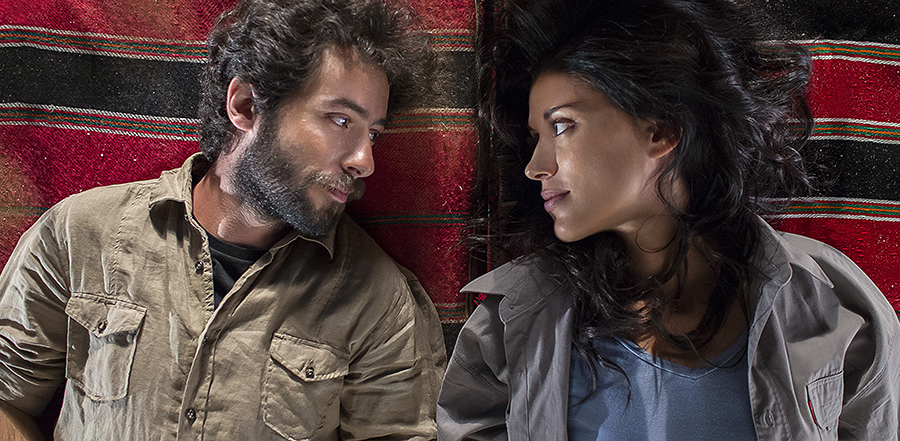
The natural pressure cooker of affection, resentment, insecurity, rivalry, sacrifice, and strength that families create is one of the most universal ways to explore our past, present, and future. Most people can relate to the strange phenomenon of going home and transforming against your will into an entirely new creature. A person who bears only a passing resemblance to the adult you have worked so hard to become. A person who is maybe more truly you than any other version you may have created, but feels slightly unnatural all the same.
In our Sept. 12 movie, “May in the Summer,” up-and-coming Palestinian American filmmaker Cherien Dabis takes the slightly altered state of being in your childhood bed again and adds the conflicts of religion and culture by examining how the pressures of going home again uniquely affect immigrant stories.
Dabis plays a successful writer who travels from New York to her childhood home of Amman, Jordan to plan her wedding. Once she arrives, the self-assured and educated woman finds herself back in the middle of parental conflicts and sibling rivalry. On top of the normal, barely controlled chaos that surrounds any wedding, she must also deal with her mother’s stringent disapproval of her fiance’s religion, her father’s sudden attempts to reconnect, and her own growing doubts about her relationship.
If there is one thing about family reunions that can be counted on, it’s chaos. Not only the events going on around us, but the emotions swirling around in our own hearts. In preparation for “May in the Summer,” let’s look at two films that use a wedding and a funeral to tell stories about how our families shape us, change us, ground us, make us crazy, and make us better than we thought we were.
“Monsoon Wedding”
The 2001 commercial breakout hit for New York-based Indian filmmaker Mira Nair also examines a wedding, bringing together family members across generations, cultures, and continents.
When a young Indian woman ends her affair with a television producer, she agrees to go through with the marriage that her parents have arranged for her with an American-raised man she barely knows. The families of both the bride and groom travel to India from all over the world and bring with them an assortment of good tidings and personal agendas. As the father of the bride struggles to maintain control of the four-day celebration, the bride hides a secret, and the mother of the bride resorts to sneaking cigarettes in the bathroom.
“Monsoon Wedding” was a substantial international hit for Nair, expanding her audience from the respected fan base she had built in previous years. The film also introduced a new generation of film buffs to the intoxicating world of modern Indian film. Nair juxtaposes the old-world traditions of an arranged marriage with the modern world of New Delhi to highlight the rich and complicated current state of India. “Monsoon Wedding” is a film where cascades of flowers fall on cellphones and very young people try to find the value in very old traditions. Generations and cultures come together to celebrate family and all that can encompass.
“Death at a Funeral”
Weddings aren’t the only events that bring family members together from far and wide for some forced bonding. In 2007, Frank Oz used the death of a family patriarch to explore the funnier side of family rivalries.
In “Death at a Funeral,” Matthew Macfadyen plays Daniel, a dutiful son who just wants to give his father a decent funeral. His plans, however, are thwarted at every turn by his successful and egotistical brother, his cousin and her accidentally inebriated boyfriend, and an incompetent undertaker. Things get even worse when an invited guest shows up and shatters any hope of a quiet, uneventful funeral that anyone may have been holding onto.
“Death at a Funeral” takes a comic approach to the ways our families can undo us at every turn. Daniel attempts in vain to remain an adult as his relatives seem to conspire to turn him back into an insecure teenager. It also has one of the most unexpected and funny takes in that moment of reckoning we all have when we are forced to see our parents as actual people, with lives that are far more complicated than we ever imagined.
Chris Rock stars in the Neil LaBute remake of this film in 2010 for American audiences. It’s one of the few times when a remake stands up to the original. Although it stays close to the original script, it also mines the particulars of American culture to create its own spin on life, death, and family obligations. Peter Dinklage, of “Game of Thrones” fame, reprises his role as a walking, talking family secret and may be even funnier in the remake. Rent them both the next time you need a solid four hour break from your own family making you nuts.
Fae Giffen studies at San Jose State in the School of Library and Information Science graduate program. She serves on the Filmworks board, working on marketing and development.
